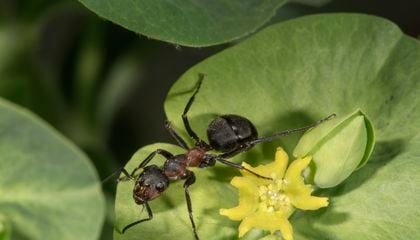Scientists Revive Ancient Bulgarian Method to Create Ant Yogurt

A team of Bulgarian scientists and chefs has successfully created yogurt from ants, reviving an ancient fermentation method that dates back centuries. This innovative project, conducted by researchers at the University of Food Technologies in Sofia, Bulgaria, combines traditional techniques with modern culinary practices.
The unique approach involves the fermentation of ant milk, which is derived from the larvae of ants. By utilizing this unconventional source, the team not only aims to introduce a novel food product but also to highlight the nutritional potential of insects, which have been consumed in various cultures for generations.
Reviving Tradition with Modern Science
The ancient method of fermentation used in this project is believed to have originated in Bulgaria, where local communities utilized the natural resources available to them. The scientists, led by a group of food technologists, have meticulously studied historical texts and practices to ensure the authenticity of the yogurt-making process.
During the fermentation, the ant larvae are collected and processed to extract their milk, which is then combined with specific bacterial cultures to initiate the fermentation process. This innovative technique not only preserves the traditional aspects of yogurt production but also provides a sustainable alternative to conventional dairy sources.
The project underscores the importance of exploring alternative food sources as the global population continues to grow. With rising concerns over food security and the environmental impact of livestock farming, insect-based foods present a viable solution. Ants require significantly less land and resources compared to traditional livestock, making them an environmentally friendly option.
Potential Health Benefits
Beyond sustainability, the yogurt produced from ants may offer various health benefits. Insects are known to be rich in protein, vitamins, and minerals, often surpassing conventional sources. The team anticipates that this ant yogurt could provide a nutritious alternative for health-conscious consumers looking for innovative dietary options.
The project has generated considerable interest in both the scientific community and the culinary world. Chefs are eager to explore the culinary possibilities of ant yogurt, considering its unique flavor profile and potential applications in various dishes.
As the project progresses, the team plans to conduct further research to evaluate the yogurt’s nutritional content and potential market viability. The hope is that this revival of an ancient Bulgarian method will not only foster appreciation for traditional practices but also pave the way for a new era of sustainable and healthy food choices.
In summary, the collaboration between scientists and chefs in Bulgaria demonstrates a creative fusion of history and innovation. By breathing new life into an ancient fermentation method, they are addressing modern challenges in food production and sustainability, offering a glimpse into the future of nutrition.






